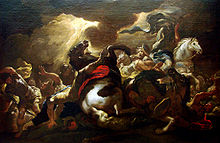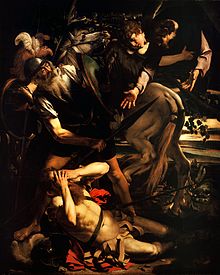
Back تحول بولس إلى المسيحية Arabic Зварот апостала Паўла Byelorussian Conversió de Pau Catalan Damaskuserlebnis German Konvertiĝo de Paŭlo Esperanto Conversión de San Pablo Spanish Conversion de Paul French Pál megtérése Hungarian Pertobatan Rasul Paulus ID Conversione di Paolo Italian
I Corinthians 15:8 - Then last of all He was seen by me also, as by one born out of due time.
This is the Apostle Paul's personal statement concerning his identity as an Apostle.
[[From Adam Clarke's Commentary on the Bible - "'And last of all he was seen of me also, as of one born out of due time." And last of all - of me also - It seems that it was essential to the character of a primitive apostle that he had seen and conversed with Christ; and it is evident, from the history of Saul's conversion, Acts 9:4-7 (note), that Jesus Christ did appear to him; and he pleaded this ever after as a proof of his call to the apostleship. And it does not appear that, after this time, Jesus ever did make any personal discovery of himself to any one.
As of one born out of due time - The apostle considers himself as coming after the time in which Jesus Christ personally conversed with his disciples; and that, therefore, to see him at all, he must see him in this extraordinary way. Some have entered into a very disgusting detail on the figure used here by the apostle. The words, ὡσπερει τῳ εκτρωματι, signify not merely one born out of due time, but one born before his time; and consequently, not bidding fair for vigor, usefulness, or long life. But it is likely that the apostle had a different meaning; and that he refers to the original institution of the twelve apostles, in the rank of whom he never stood, being appointed not to fill up a place among the twelve, but as an extra and additional apostle. Rosenmuller says that those who were beyond the number of twelve senators were termed abortivi, abortives; and refers to Suetonius in Octavio, cap. 35. I have examined the place, but find no such epithet. According to Suetonius, in that place, they were called orcini - persons who had assumed the senatorial dignity after the death of Julius Caesar, pretending that they had derived that honor from him."']]


The conversion of Paul the Apostle (also the Pauline conversion, Damascene conversion, Damascus Christophany and the "road to Damascus" event) was, according to the New Testament, an event in the life of Saul/Paul the Apostle that led him to cease persecuting early Christians and to become a follower of Jesus.
© MMXXIII Rich X Search. We shall prevail. All rights reserved. Rich X Search